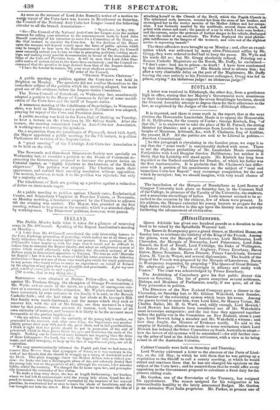IRELAND.
The Dublin Monitor hails what it takes for a glimpse of returning sense in Mr. O'Connell. Speaking of the Repeal Association's meeting on Monday
" A letter from Mr. O'Connell constituted the only interesting feature in the Corn Exchange proceeding of yesterday, which indeed are at all times perfectly ridiculous when the master-spirit is not present. Some portions of Mr. O'Connell's letter inspire us with the hope that it would not be difficult to induce him to abandon the Repeal fatuity, and adopt an enlightened system of action which would effectually rally together the disunited sections of the Reform party in determined opposition to Toryism. 'Tis true he still ' Hurrahs for Repeal'; but it is also to be observed that his letter contains the following declaration—' lain not one of those who would give credit for much patriotism to any person who would refuse to make an experiment on behalf of Ireland by the adoption of any plan that was plausible and practicable. I,for my own part, would of course join in such a plan.'"
[Of course, that or any thing else.]
Summonses were obtained at Dublin Police-office, on Saturday, against Mr. Tresharn Gregg, the champion of Orange Protestantism, a Mr. Wylie, and an uncle of the latter, on a charge of outrageous conduct at a convent, and forcible abduction. Mr. Wylie's sister had lately been converted, by some servants in the family it is said, to the Roman Catholic faith ; and she had taken up her abode at St. George's Hill. Her family were much distressed ; and the means which they took to recover her, with the aid of Mr. Gregg, are thus narrated in a long letter by that person ; whose account we borrow, both because of its own curiosity of manner, and because it is likely to be the account most favourable to the parties implicated " On my advice, armed with the authority of the young lady's mother, we proceeded to the convent, and, after some delay, the Superioress and another elderly person drew near with much air' great state, and in full pontificalibus. I think it right that the public should be put in possession of the sort of priestcraft which in these places blinds the eyes and bewitches the souls of the simple. Nothing can be conceived more dramatic nor imposing than the dress of these kidnappers : tbe hood, the veil, the lappet, the holy cross, the holy beads, and other trumpery, to keep up the idea of superhuman piety, are all in requisition.
"We very unceremoniously informed the Popish pair that we had come to remove Miss W— from that synagogue of &tan, as it was contrary to the wish of her friends that she should be brought up a votary of Antichrist and of the Devil. This plain language threw the Mother Abbess into a violent passion: she broke out into a Billingsgate abuse of me, and solemnly denied that the young lady was on the premises at all; although the servant, a few minutes before, stated the contrary. We charged the lie home upon her, and peremptorily demanded the surrender of her victim.
"To make a long story short, she was at length forthcoming: her brother, whom we had left to communicate with the young lady alone, found her disposed to remain; but feeling himself warranted by the mandate of her natural guardian, he constrained her at once to leave the abode of fanaticism, and she was brought out into the street. Here I besought her to renounce the idea of attaching herself to the Church of the Devil, which the Popish Church is. The infuriated mob, however, wrested her from the arms of her brother, and reconsigned her to the tender mercies of the Mother Abbess and her companion. I was furiously assailed by the multitude, several times struck, and pelted with stones and mud ; the panels of a car in which I rode were broken ; and the carman, under the pretence of further danger to his vehicle, discharged me into the midst of my assailants. The Police displayed the most philosophic indifference to the dangers of the moment, and were not of the slightest service in repressing tumult."
The three offenders were brought up on Monday ; and, after an examination which was enlivened by many ultra-Protestant sallies by Mr. Gregg, they were ordered to find bail to keep the peace. Mr. Wylie and his uncle did so ; but Mr. Gregg absolutely refused. Pointing out a Roman Catholic Magistrate on the Bench, Mr. Duffy, he exclaimed" I don't care: lead me to prison—to death! I have been condemned by that idolatrous Magistrate!" His friends tried to silence him; but after a very charitable delay on the part of the Magistrates, Mr. Daffy leaving the case entirely to his Protestant colleagues, Gregg was led to prison, crying "An idolatrous judge! an idolatrous judge !"


























 Previous page
Previous page